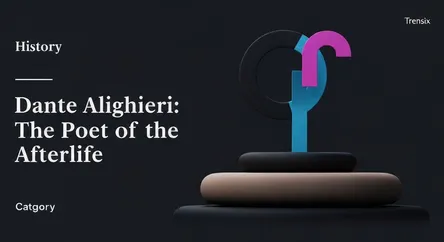History
Dante Alighieri: The Poet of the Afterlife

Explore the life and work of Dante Alighieri, the medieval poet whose "Divine Comedy" shaped the Italian language and our vision of the afterlife.
What is it?
Dante Alighieri (c. 1265-1321) was a preeminent Italian poet, writer, and philosopher from Florence. He is often called the "Father of the Italian language" for his decision to write in the vernacular Tuscan dialect instead of Latin, making literature more accessible. His most famous work is the monumental epic poem, "The Divine Comedy" ("La Divina Commedia"). This masterpiece narrates his allegorical journey through the three realms of the afterlife: Inferno (Hell), Purgatorio (Purgatory), and Paradiso (Paradise). Guided by the Roman poet Virgil, Dante encounters historical and mythological figures, creating a complex tapestry of theology, philosophy, and social commentary that bridged the Middle Ages and the Renaissance.
Why is it trending?
Interest in Dante is perennial, as his work explores timeless themes of sin, redemption, and the nature of good and evil. His influence has remained unbroken for over 700 years. "The Divine Comedy" continues to inspire a vast range of modern culture, including literature, paintings, films, music, and even video games. The 700th anniversary of his death in 2021 sparked renewed global interest. Furthermore, Dante's vivid and structured depiction of Hell, in particular, has become deeply embedded in the collective imagination, making his work a recurring reference point for exploring concepts of justice and morality.
How does it affect people?
Dante's work has profoundly shaped Western culture's understanding of the afterlife. His imaginative vision of Hell, with its specific circles and symbolic punishments ("contrapasso"), has influenced countless artistic and literary depictions of damnation. By writing in the Tuscan dialect, he was instrumental in establishing the modern standardized Italian language. On a personal level, his journey resonates with universal human experiences. Themes such as exile (which Dante himself experienced), the search for spiritual meaning, and the reconciliation of romantic and divine love continue to captivate and provoke thought in readers worldwide. His exploration of free will and divine justice continues to be relevant in contemporary discussions on morality and ethics.